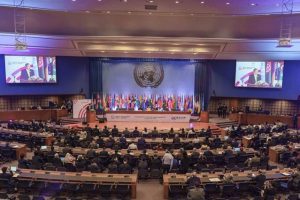Australia’s foreign minister said on Thursday she had proposed a prisoner swap to her Indonesian counterpart in an 11th hour effort to save the lives of two Australian drug smugglers expected to face a firing squad within days
JAKARTA (Indonesia) – Indonesia’s deputy foreign minister Abdurrahman Mohammad Fachir said on Thursday the government has rejected Australia’s proposal of a prisoner swap to save the lives of two convicted Australian drug traffickers on death row, according to media reports.
The rejection of the deal was reported by Indonesia’s MetroTV.
Australia’s foreign minister has proposed a prisoner swap with Indonesia, in a last-ditch attempt to prevent the execution of two Australian citizens convicted on drugs charges by Indonesia.
Foreign Minister Julie Bishop’s intervention in the case of convicted heroin smugglers Myuran Sukumaran and Andrew Chan comes soon after the pair were moved to an Indonesian prison where executions are carried out. Bishop told Australia’s Sky News that she spoke to her Indonesian counterpart, Retno Marsudi, to explore any other options that might save the prisoners’ lives. Sukumaran and Chan were arrested in 2005 in Bali while trying to smuggle 18 pounds of heroin from Indonesia to Australia.
“I asked for a pause in their preparations for the executions so we could have officials explore these ideas,” she reportedly said. “I asked if we could have an opportunity to explore any other avenues.”
The deal Australia is proposing would involve repatriating three Indonesian citizens who were jailed in Australia as the result of a 1998 drug bust, Australia’s biggest-ever seizure at the time. The three — Kristito Mandagi, Saud Siregar and Ismunandar, known only by one name — were the captain, the chief officer and the engineer of a boat carrying 390 kilograms of drugs. Some reports have suggested that Indonesian authorities have rejected the proposal, but that has yet to be officially confirmed.
In 2006, an Indonesian court ruled that Sukumaran and Chan had recruited a number of other people — now referred to as the “Bali Nine” — into their scheme. Seven others convicted of involvement in the plot are serving sentences of between 20 years and life, after some had their death sentences revoked on appeal, the BBC reported.
Australian Prime Minister Tony Abbott confirmed to The Australian that his government had “put in a request” to speak with Indonesian President Joko Widodo, but said that he “can’t guarantee the request will be met.”
“We respect Indonesia, we honor the friendship that we have with Indonesia, but we stand up for our values and we stand up for our citizens and these are Australian citizens in extremis,” he added.
Indonesia has some of the harshest penalties for drug offenses in the world. The plight of the Australians has elicited a strong public reaction in their native country, with the government reminding Indonesia of the $1 billion in aid the country provided to it after the 2004 tsunami. Australians have also made unfavorable comparisons to the treatment handed out to Indonesian terrorists who killed 92 Australians in the 2002 and 2005 Bali bombings, 36 of whom have since been freed from jail, according to Australia’s Telegraph.




